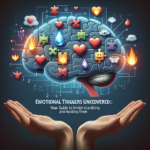Breaking Down the Impact: How Substance Abuse Alters Brain Function – The Ultimate Guide
Introduction
Every day, millions face the consequences of substance abuse, whether through personal experience or the effects felt in their communities. From the young person experimenting with drugs for the first time to the adult caught in the grips of addiction, the impact of substance abuse is profound and far-reaching. But what exactly happens within the brain that leads to such drastic changes in behavior and health? This is the crux of our exploration in "Breaking Down the Impact: How Substance Abuse Alters Brain Function." Understanding these changes is essential not only for those battling addiction but also for families, friends, and professionals striving to help. This comprehensive article will dive into the science of how substance abuse can alter brain function, dissecting the underlying mechanisms, examining real-world implications, and providing practical insights for recovery.
Understanding the Brain and Substance Abuse
The human brain is a complex organ responsible for various functions, including thoughts, emotions, memory, and motor skills. It’s composed of billions of neurons, which communicate through synapses using neurotransmitters. This neural communication is essential for regulating mood, behavior, and even the physical sensations of pleasure and pain.
What Happens When Substances Enter the Brain?
Substance abuse fundamentally alters the intricate balance of neurotransmitters. Different substances affect different receptors and circuits in the brain. For instance:
- Alcohol: Primarily impacts the GABA (gamma-aminobutyric acid) system, leading to feelings of relaxation and euphoria but also resulting in impaired judgment and motor functions.
- Cocaine: Inhibits dopamine reuptake, flooding the brain with this “feel-good” neurotransmitter. This powerful stimulation can result in intense but temporary pleasure, often leading to compulsive use.
- Opioids: Bind to opioid receptors, mimicking naturally occurring neurotransmitters. This not only mitigates pain but can also lead to euphoric feelings, significantly reinforcing the desire for the drug.
These alterations can lead to the brain becoming dependent on substances to achieve normal functioning, ultimately resulting in addiction.
Figure 1: Neurotransmitter Systems Affected by Common Substances
| Substance | Affected Neurotransmitter | Effect on the Brain |
|---|---|---|
| Alcohol | GABA | Sedation, impaired coordination |
| Cocaine | Dopamine | Intensified pleasure, euphoria |
| Opioids | Endorphins | Pain relief, increased pain threshold |
| Nicotine | Acetylcholine | Increased alertness, pleasure |
| Methamphetamine | Dopamine | Heightened energy, euphoric rush |
The Stages of Brain Alteration Due to Substance Abuse
1. Initial Consumption and Reward Pathways
When an individual consumes a substance, the immediate impact on the brain’s reward pathways is often evident. Neurotransmitters like dopamine increase, reinforcing the behavior that led to the substance’s use. This is where the pleasure cycle begins.
Case Study: The Rise of Opioid Use in the United States
The opioid epidemic serves as an eye-opening example of how quickly substance abuse can impact brain function and behavior. Initially prescribed for pain relief, opioids flooded the market, leading individuals down a path of dependency. Researchers have found that prolonged opioid use alters dopamine receptors, making it harder for individuals to experience pleasure without the drug, thus exacerbating addiction cycles.
2. Tolerance Development
As substance use continues, the brain attempts to maintain balance (homeostasis). This leads to tolerance, where higher doses of the substance are required to achieve the same effect. For example, chronic alcohol users may need to consume larger quantities to feel intoxicated, often leading to severe health issues.
3. Dependence and Withdrawal
When the brain becomes reliant on a substance to function, withdrawal symptoms emerge when the substance is unavailable. These symptoms can range from mild discomfort to severe physiological reactions, including seizures, anxiety, and even psychosis.
Case Study: Alcohol Withdrawal Syndrome
Individuals with alcohol dependency often experience withdrawal symptoms that can be fatal if not treated. The neurological changes associated with alcohol dependency can lead to tremors, hallucinations, and seizures—highlighting the drastic brain function alterations that occur.
4. Long-Term Changes: Structural and Functional Adaptations
Prolonged substance abuse can lead to chronic alterations in brain structure and function. Studies have shown reduced grey matter volume in individuals with a history of prolonged alcohol abuse, affecting cognition, decision-making, and impulse control.
Table 1: Structural Brain Changes Linked to Substance Abuse
| Substance | Brain Region Affected | Change Observed |
|---|---|---|
| Alcohol | Prefrontal Cortex | Reduced grey matter volume |
| Cocaine | Striatum | Impaired reward processing |
| Methamphetamine | Amygdala | Increased risk-taking behavior |
| Nicotine | Hippocampus | Impaired memory functions |
The Path to Recovery: Restoring Brain Function
Understanding the damaging alterations in brain function due to substance abuse is vital for recovery. But there is hope. The brain is remarkably resilient and can begin to heal once substances are removed from the equation.
Neuroplasticity: The Brain’s Healing Mechanism
Neuroplasticity refers to the brain’s ability to change and adapt throughout an individual’s life. Engaging in positive behaviors, such as therapy, exercise, and social bonding, can help promote rewiring of the brain.
Case Study: Recovery from Cocaine Addiction
Research has shown that individuals recovering from cocaine addiction who participate in cognitive behavioral therapy (CBT) exhibit positive neural adaptations over time. As they engage in structured therapy, areas of the brain previously impacted by addiction begin to show recovery in function, leading to improved impulse control and decision-making.
Practical Tips for Encouraging Brain Recovery
- Therapy: Cognitive Behavioral Therapy and Motivational Interviewing can facilitate change.
- Exercise: Physical activity has been linked to increased dopamine production.
- Mindfulness and Meditation: These practices can improve emotional regulation and decrease anxiety.
Conclusion
Breaking Down the Impact: How Substance Abuse Alters Brain Function serves as a crucial reminder of the intricate relationship between the brain and substance use. Understanding how substances affect brain function provides valuable insights for those impacted by addiction and influences effective treatment plans. Recovery is a journey, and while brain alterations can be profound, the capacity for healing is equally significant. By investing in therapeutic practices, embracing lifestyle changes, and fostering supportive relationships, individuals can reclaim their lives and restore brain function.
FAQs
1. What is substance abuse, and how is it defined?
Substance abuse is the harmful or hazardous use of psychoactive substances, including alcohol and illicit drugs. It often leads to significant impairment or distress in social, occupational, or other important areas of functioning.
2. How do different substances affect the brain differently?
Different substances interact with different neurotransmitter systems and brain regions. For instance, opioids primarily affect pain and pleasure pathways, while stimulants like cocaine increase dopamine levels, leading to intense feelings of euphoria.
3. Can the brain heal after substance abuse?
Yes, the brain has a remarkable capacity for recovery through neuroplasticity. With appropriate treatment, support, and lifestyle changes, many individuals can experience significant improvements in brain function and overall well-being.
4. What are some common withdrawal symptoms?
Common withdrawal symptoms can include anxiety, irritability, physical discomfort, changes in sleep patterns, and in severe cases, seizures or psychosis, depending on the substance involved.
5. How can loved ones support someone struggling with addiction?
Providing emotional support, encouraging them to seek professional help, participating in family therapy, and creating a conducive environment for recovery can be incredibly supportive for someone battling addiction.
This article is intended for informational purposes only and should not be considered a substitute for professional advice. If you or someone you know is struggling with substance abuse, it’s important to seek help from licensed professionals.

















